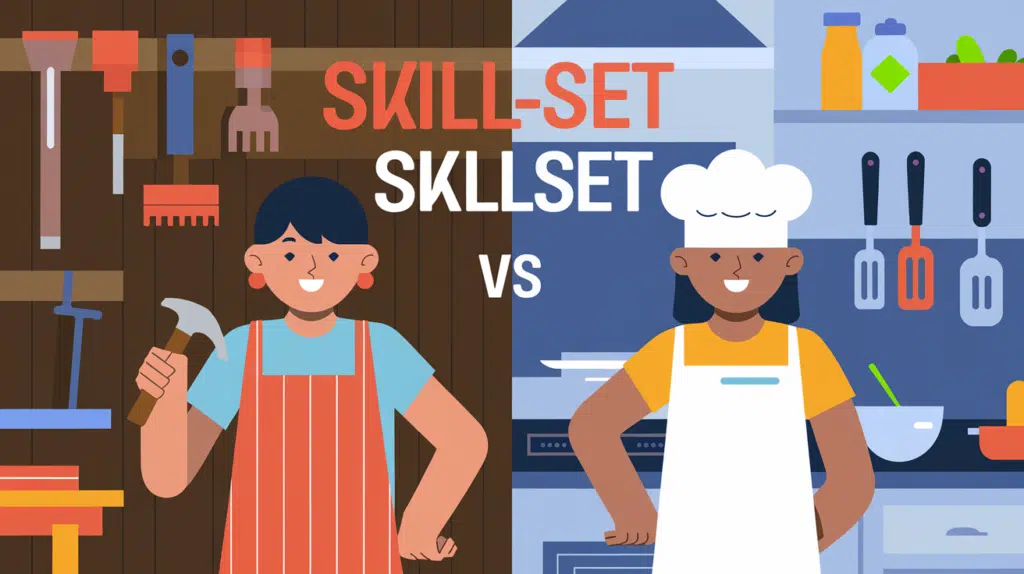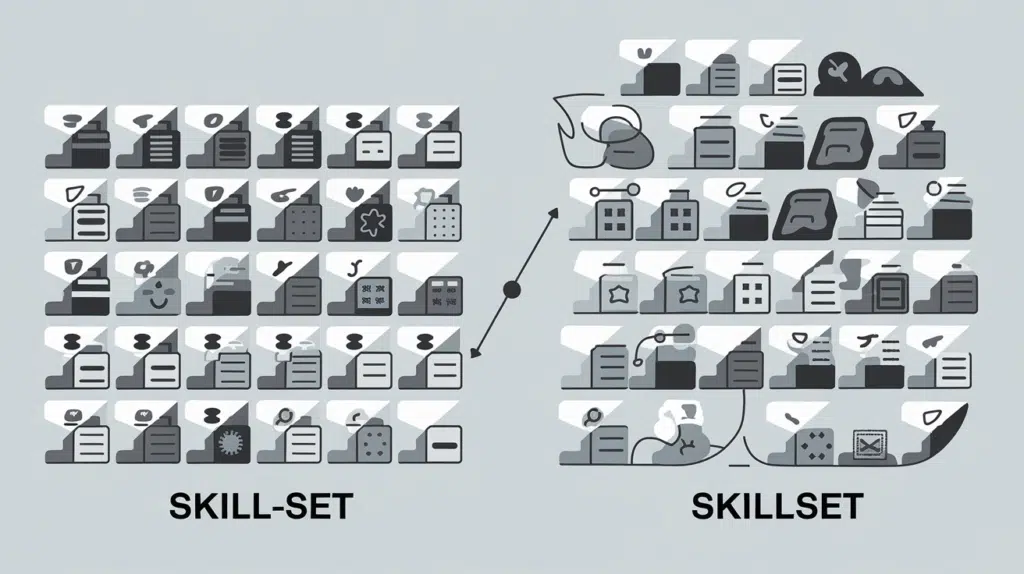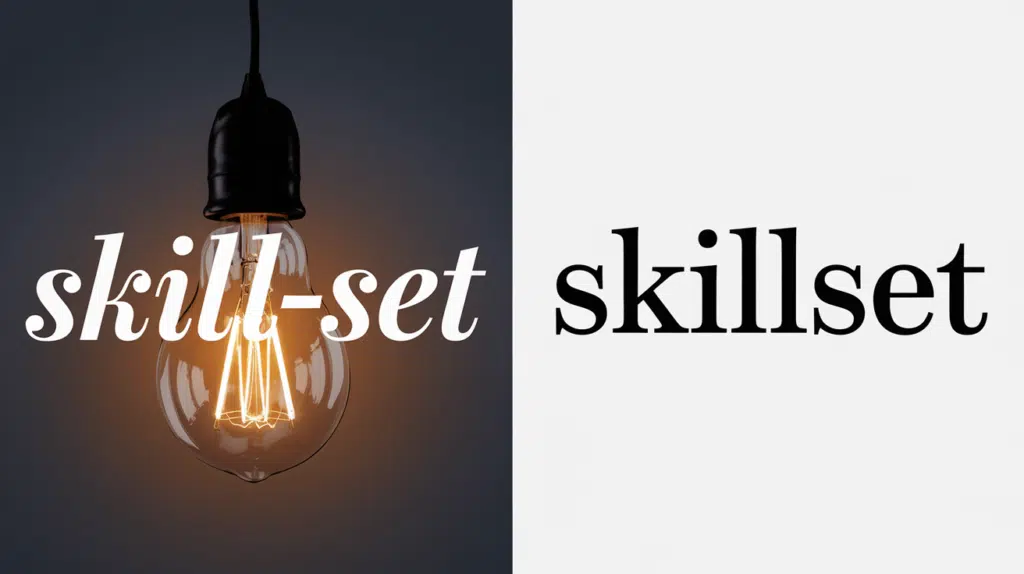Have you ever wondered whether to write “skill set” or “skillset”?
You’re not alone.
Both versions appear in job descriptions, resumes, and professional writing but which one is actually correct?
The truth is simple: both forms exist, but context matters.
In this updated 2026 guide, we’ll break down:
- The correct spelling according to major style guides
- When to use “skill set”
- When “skillset” is acceptable
- Whether “skill-set” (hyphenated) is wrong
- Real examples for professional and academic writing
Let’s clear up the confusion once and for all.
Read more : “Totalling” vs. “Totaling”: Navigating the Spelling Dilemma – Grammar Beacon

What is a “Skillset”?
To start, let’s define what a “skillset” is. A skillset refers to a collection of abilities, knowledge, and expertise that a person possesses. It encompasses both hard skills specific technical abilities and soft skills, which include interpersonal traits and behaviors.
Example Scenario
Imagine a software engineer. Their skillset might include:
- Proficiency in programming languages like Python and Java.
- Strong problem-solving abilities.
- Excellent communication skills for teamwork.
Each of these components contributes to their effectiveness in the workplace, showcasing how diverse and crucial a skillset can be.
What is a “Skill Set”?
Now, let’s discuss “skill set.” This two-word phrase has a similar meaning to “skillset,” but its format emphasizes the individuality of each skill. By separating the words, you can highlight specific abilities that make up the overall skill set of a person.
Read more : Cacoon vs Cocoon Spelling – Grammar Beacon
Example Scenario
Consider a project manager. Their skill set may include:
- Leadership skills for guiding a team.
- Organizational skills for managing multiple tasks.
- Risk management skills to handle uncertainties.
In this case, separating the words places more focus on the individual components that contribute to their overall competence.
Skill Set vs Skillset What’s the Real Difference?
The primary difference between “skillset” and “skill set” is stylistic and contextual. While both terms convey the same basic idea, “skillset” has become more casual and modern, often used in less formal settings.
Conversely, “skill set” adheres to traditional grammatical norms and is typically favored in formal writing.
Read more : Scrapped vs Scraped – Grammar Beacon
Examples in Context
Skillset: “Her skillset includes both technical and interpersonal abilities, making her a strong candidate for the role.”
Skill Set: “A diverse skill set is essential in today’s fast-paced job market.”
When Should You Use Skill Set or Skillset?
Another variation is the hyphenated form, “skill-set.” This version is less common but still appears in certain contexts. The hyphen often implies a specific set of skills tailored for a particular job or task.

Read more : Agreeance vs Agreement – Grammar Beacon
Example Scenario
You might say, “The skill-set required for this position includes advanced analytical abilities and a customer-oriented mindset.” This emphasizes a defined group of skills that are necessary for success in that specific role.
Historical Usage of “Skill Set” and “Skillset”
Historically, “skill set” has been the preferred term in professional and academic contexts. Over time, the emergence of “skillset” as a more casual alternative reflects the evolution of language and shifts in workplace culture.
Understanding this historical context can help you make informed choices about which term to use.
The Shift in Language
As workplaces have become more dynamic and informal, the acceptance of terms like “skillset” has grown. This change mirrors broader trends in language, where traditional rules adapt to reflect modern communication styles.
However, knowing when to use each form can help you navigate different professional environments effectively.
Regional Differences in Usage
Language usage can vary significantly across regions, and this is certainly true for “skillset” and “skill set.” In the United States, “skill set” remains the dominant choice, particularly in formal contexts.
However, “skillset” has gained popularity in more casual settings, especially in tech and creative industries.
Read more : Excel or Accel – Grammar Beacon

Global Variations
In the UK and other English-speaking countries, you’ll often find more people sticking to “skill set.” This regional preference highlights the importance of being aware of your audience when choosing your terminology.
Grammar and Style Guides on “Skill Set”
If you’re looking for guidance on which term to use, grammar and style guides can be incredibly helpful. Most reputable style manuals, such as the Chicago Manual of Style and APA Style, endorse “skill set” as the standard spelling.
These guides prioritize clarity and consistency, which are essential in professional writing.
Recommended Usage
When drafting formal documents or academic papers, opt for “skill set” to align with established norms. In more casual or creative contexts, you might choose “skillset” to reflect a more relaxed tone.
Read more : Luis’ or Luis’s Possessives – Grammar Beacon
Public Perception and Trends
The public perception of “skillset” versus “skill set” has evolved over the years. As workplaces have shifted towards a more casual environment, the acceptance of “skillset” has increased.
However, for professionals aiming for a formal tone, it’s still advisable to use “skill set.”
The Impact of Technology
The rise of digital communication has also influenced language trends. In online job postings and social media, you’ll frequently encounter “skillset” as a buzzword.
This trend reflects the desire for concise and impactful language, which appeals to modern audiences.
Examples in Context
To further illustrate the differences between “skillset” and “skill set,” let’s explore more scenarios where each term might be used.
In Professional Settings
Skillset: “His skillset includes data analysis, project management, and a deep understanding of market trends.”
Skill Set: “To succeed in this field, you need a skill set that includes both technical knowledge and soft skills.”
In Academic Contexts
Skillset: “Many universities now focus on developing a diverse skillset among their students to prepare them for the job market.”
Skill Set: “The curriculum is designed to enhance each student’s skill set, ensuring they are well-rounded graduates.”
Possessive Forms of “Skill Set” and “Skillset”
Let’s explore the possessive forms of “skill set” and “skillset.” Understanding how to correctly use possessives can further enhance your clarity and precision in writing.

Singular Possessive
Skillset: “Her skillset’s adaptability allows her to thrive in various roles.”
Skill Set: “The project manager’s skill set is extensive and diverse.”
Plural Possessive
Skillsets: “Different professions have unique skillsets’ demands and expectations.”
Skill Sets: “The team’s combined skill sets create a powerful collaborative environment.”

Additional Possessive Examples
Skillset: “The graphic designer’s skillset includes both creativity and technical prowess.”
Skill Set: “The engineer’s skill set is essential for the success of this project.”
Common Misconceptions
As with many aspects of language, misconceptions can arise. Here are a few common misunderstandings regarding “skillset” and “skill set.”
Misconception 1: They Are Completely Interchangeable
While “skillset” and “skill set” have similar meanings, they are not entirely interchangeable. The context and tone of your writing will influence which term is more appropriate.
Misconception 2: Hyphenation is Always Necessary
The hyphenated form, “skill-set,” is less frequently used, and many style guides do not recommend it. It’s important to recognize that most contemporary writing favors “skill set” or “skillset.”
Misconception 3: Only One Form is Correct
Both “skill-set” vs “skillset” have their place in the English language. The key is to choose the term that best fits your audience and context.
How to Decide Which Term to Use
When deciding between “skillset” vs “skill set,” consider the following factors:
Audience: Are you writing for a formal or informal audience? Choose “skill set” for formal contexts and “skillset” for casual ones.
Purpose: What is the goal of your writing? If clarity is paramount, “skill set” might be the better option.
Industry Norms: Certain fields may have established preferences. Research the conventions in your industry to ensure you align with standard practices.
Common Mistakes with Skill Set and Skillset
Short example add karein:
- ❌ Her skillset are impressive.
- ✅ Her skill set is impressive.
- ❌ The required skill-set includes… (hyphen unnecessary in most cases)
“Mistakes” sections snippet mein aate hain.
Frequently Asked Questions
Is it skill set or skillset?
Traditionally, “skill set” is the correct and widely accepted spelling in formal writing. “Skillset” is more informal.
What do style guides recommend?
Most major style guides recommend “skill set” as two words.
Is skill-set with a hyphen correct?
The hyphenated form is uncommon and generally unnecessary in modern writing.
Which spelling is better for a resume?
Use “skill set” on resumes to maintain professionalism and consistency.
Is skillset wrong?
Not exactly. It’s increasingly used in casual and tech-related writing, but not preferred in formal contexts.
Conclusion
The difference between skill set and skillset comes down to formality and audience.
If you’re writing professionally, academically, or for business purposes, skill set is the safest and most widely accepted choice.
“Skillset” isn’t technically wrong it’s simply more modern and informal.
When in doubt, choose clarity and consistency. That’s what makes writing look polished and credible in 2026 and beyond.

James Logan is a seasoned blogger and language enthusiast behind Grammar Beacon. With years of experience in grammar and writing, James shares his expertise through insightful and engaging content. His passion for clear communication and linguistic precision shines in every post, making complex grammar concepts accessible and enjoyable for readers. Follow James for expert advice and tips to refine your writing skills.







